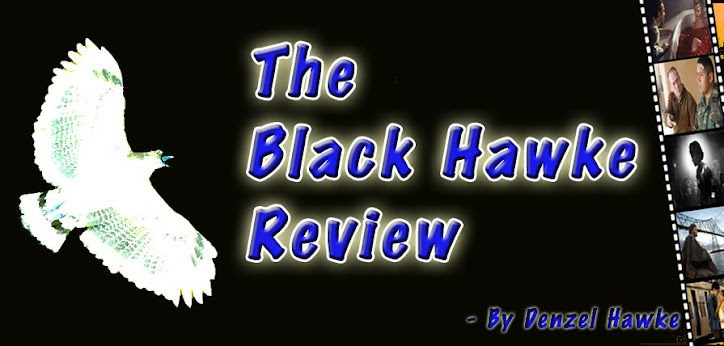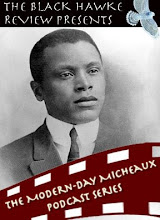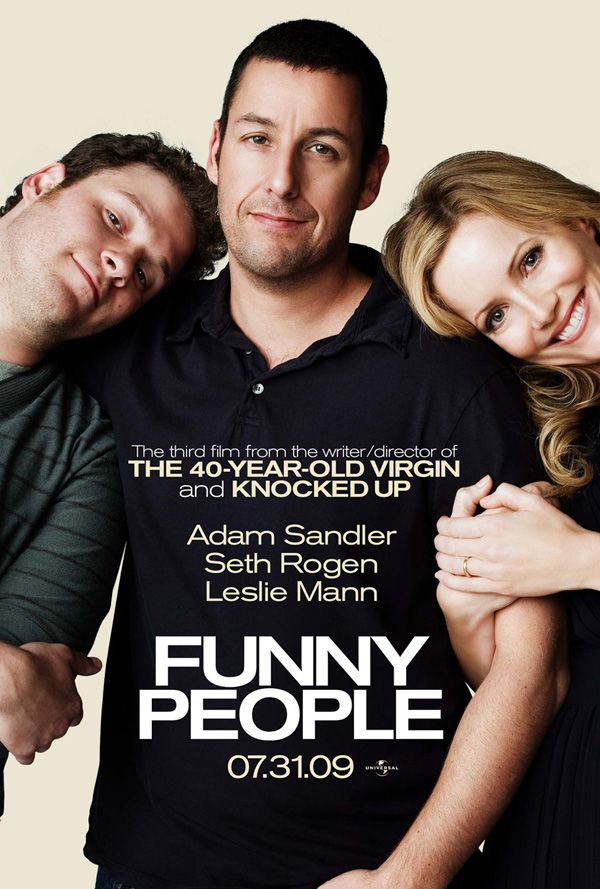Friday, July 31, 2009
Black FIlm Watch: Pastor Brown
Wednesday, July 29, 2009
Oscar Buzz - Anthony Mackie & Hurt Locker
 Some of Anthony Mackie's most notable roles include Clarence "Papa Doc" in 8 Mile, John Henry Armstrong in Spike Lee's She Hate Me, Frank in Half Nelson, and then of course, Tupac in the Biggie Smalls biopic Notorious.
Some of Anthony Mackie's most notable roles include Clarence "Papa Doc" in 8 Mile, John Henry Armstrong in Spike Lee's She Hate Me, Frank in Half Nelson, and then of course, Tupac in the Biggie Smalls biopic Notorious. Sunday, July 19, 2009
Black Film Watch: Prom Night In Mississippi
 With Barak Obama President, in this so-called "post-racial" society, it's hard to remember we still have a long way to go in ridding this country of racial prejudices. Prom Night In Mississippi tells the well-known story of a high school in Mississippi that still holds segregated proms. The film premieres on HBO on Monday, July 20th at 9PM/8C.
With Barak Obama President, in this so-called "post-racial" society, it's hard to remember we still have a long way to go in ridding this country of racial prejudices. Prom Night In Mississippi tells the well-known story of a high school in Mississippi that still holds segregated proms. The film premieres on HBO on Monday, July 20th at 9PM/8C. Donald Glover in Variety

Atlanta boy Donald Glover credits his "unusual" upbringing for forming and informing his comedic outlook on life.
"My parents had a lot of foster kids living with us, and a lot of my stuff is autobiographical -- stuff that weirded me out as a kid," he says. "I was the only black kid in my school for a long time, and I got picked on a lot as I was a big nerd. I was really into 'Star Trek' and 'Looney Tunes' and crafts and writing plays. I wasn't one of the cool kids."
That all changed when he moved to New York to study at the Tisch School of the Arts for four years. "I started doing sketch, then standup and improv, although I always just liked the term 'comedian,' as then people don't put you in a box," he notes.
Glover was still a resident assistant at NYU when he landed a staff writer gig on the show "30 Rock."
"It changed my life -- and my comedy," he says. "Tina Fey took me under her wing and really pushed me to find my own voice. Going in, I didn't really know who I was comedically, but coming out (after writing there for the first three seasons), I felt far more confident."
Since recently moving to L.A., the 25-year-old comedian and writer has performed a lot with the Upright Citizens Brigade Theater. "I also head to the Laugh Factory and try some standup anywhere there's some free space," he adds. "I really like the underground comedy scene here as it gives you a chance to try out material you can't always do in some places."
Next up is his first feature, "Mystery Team," which he co-wrote, produced, scored and starred in. The film, which he calls "an homage to 'Encyclopedia Brown,' " premiered at Sundance and will be released this fall.
POV: "Most people think I'm Danny Glover's son when they meet me. So when they ask, I say 'No, I'm Crispin Glover's son.' Then we stare at each other for a long time."
Thursday, July 16, 2009
THE BLACK EMMY'S
 I know, there's no such thing. And African-Americans in the TV Business haven't exactly busted down the doors at the Emmy Awards, however we do get our notable wins here and there and have a healthy field of respresenation. Nominations for the 2009 Emmy's were announced today. Below are a list to the black contenders. Congratulations to all and good luck.
I know, there's no such thing. And African-Americans in the TV Business haven't exactly busted down the doors at the Emmy Awards, however we do get our notable wins here and there and have a healthy field of respresenation. Nominations for the 2009 Emmy's were announced today. Below are a list to the black contenders. Congratulations to all and good luck. Wednesday, July 15, 2009
The War Is On: The Discussion Continues
Saturday, July 11, 2009
The War Is On: Black Men Vs. Black Women

Thursday, July 9, 2009
O'Reilly Tells Blacks Whom To Iconize?

Wednesday, July 8, 2009
SEX AND THE CITY REVIEW
 A women's movie goers wet dream? I may get flack for reviewing the biggest chick flick if there ever was one, but female driven films are just as important as minority films and I'll state why below. I'll also be reviewing high testosterone, ball-busting, Tom Cruise action flick Valkyrie later this week to balance the scale.
A women's movie goers wet dream? I may get flack for reviewing the biggest chick flick if there ever was one, but female driven films are just as important as minority films and I'll state why below. I'll also be reviewing high testosterone, ball-busting, Tom Cruise action flick Valkyrie later this week to balance the scale.  = 2 Stars
= 2 Stars = 2 Black Fists
= 2 Black Fists
MODERN-DAY MICHEAUX EPISODE 2
 Big thanks to Dwayne Buckle for being my distinguished guest on Episode 2 of The Modern-Day Micheaux Podcast Series. Dwayne had a lot of inspirational and motivating things to say, as well as discussing the power of film as an artistic medium, minorities owning their works to and companies in order to create power, and not compromising one artistic vision for Hollywood bucks. The Podcast can be listened to below, but first, Dwayne's favorite Michael Jackson song, Liberian Girl. I've included the song and the music video, because it's kind of hard to hear the music in the music video strange enough. Again, big thanks to Dwayne Buckle and we wish him all the luck in the future.
Big thanks to Dwayne Buckle for being my distinguished guest on Episode 2 of The Modern-Day Micheaux Podcast Series. Dwayne had a lot of inspirational and motivating things to say, as well as discussing the power of film as an artistic medium, minorities owning their works to and companies in order to create power, and not compromising one artistic vision for Hollywood bucks. The Podcast can be listened to below, but first, Dwayne's favorite Michael Jackson song, Liberian Girl. I've included the song and the music video, because it's kind of hard to hear the music in the music video strange enough. Again, big thanks to Dwayne Buckle and we wish him all the luck in the future. Sunday, July 5, 2009
The Modern-Day Micheaux Podcast Series: Episode 2
 Check out episode two of The Modern-Day Micheaux Podcast Series on Tuesday, July 7th, @10PM when I speak to independent filmmaker Dwayne Buckle, filmmaker of The Minority and The Glasses.
Check out episode two of The Modern-Day Micheaux Podcast Series on Tuesday, July 7th, @10PM when I speak to independent filmmaker Dwayne Buckle, filmmaker of The Minority and The Glasses.The Modern-Day Micheaux Podcast Series is a monthly 30-minute discussion with black, independent filmmakers. The mission is to inform and inspire, as well as motivate and shed insight. However, unlike Tanya Kersey’s Urban Hollywood series, this podcast focuses on the inspirational and highlights filmmakers still in the trenches. The moderator is Denzel Hawke of The Black Hawke Review.
Gabrielle Union Flick
 Neo Ned is a film from 2005 that I've just become aware of. Ned, a member of the Aryan Brotherhood, falls in love with Gabrielle Union's character while in a mental institution.
Neo Ned is a film from 2005 that I've just become aware of. Ned, a member of the Aryan Brotherhood, falls in love with Gabrielle Union's character while in a mental institution. Saturday, July 4, 2009
Precious Co-Signer
 On May 18th, 2009, Communications strategist David Magdeal spoke with Tanya Kersey on the "Inside Urban Hollywood" podcast. Working on the media campaign for Precious, this is what he had to say.
On May 18th, 2009, Communications strategist David Magdeal spoke with Tanya Kersey on the "Inside Urban Hollywood" podcast. Working on the media campaign for Precious, this is what he had to say."For me the most amazing thing was Mo'Nique. If she's not nominated then there's something wrong. And then the new girl, the one that plays Precious, Gabby, she nailed that to the wall. Everybody in there is really good. You don't even recognize Mariah. I had to even do a double take. Like that's Mariah? Oh. She's really good."
Precious's theatrical release is November 6th. With Oscar's new 10 best picture change, its practically a shoe-in to garner a nomination. Mo'Nique's, Gabourney Sidibe's, and Mariah Carey's performances have all popped up on shortlists for Oscar contenders as well.
Friday, July 3, 2009
Is Transformers Racist? The Discussion Continues:
 Since the outrage of the Transformers 2 character's known as Skids and Mudflap (also known as the term Sambots) has only intensified since the film broke box office records last week, and friend and I have been verbally jousting on whether this can be construed as racist or not.
Since the outrage of the Transformers 2 character's known as Skids and Mudflap (also known as the term Sambots) has only intensified since the film broke box office records last week, and friend and I have been verbally jousting on whether this can be construed as racist or not. Thursday, July 2, 2009
THE SOLOIST REVIEW
 Before the huge 2009 "Precious" buzz, this was the movie of the year I couldn't wait to see. Robert Downey Jr, Jamie Foxx and director Joe Wright, about a musician whom plays classical music, how can you go wrong???? We soon will see.
Before the huge 2009 "Precious" buzz, this was the movie of the year I couldn't wait to see. Robert Downey Jr, Jamie Foxx and director Joe Wright, about a musician whom plays classical music, how can you go wrong???? We soon will see.  = 2 Stars
= 2 Stars = 2 Black Fists
= 2 Black Fists
















.jpg)